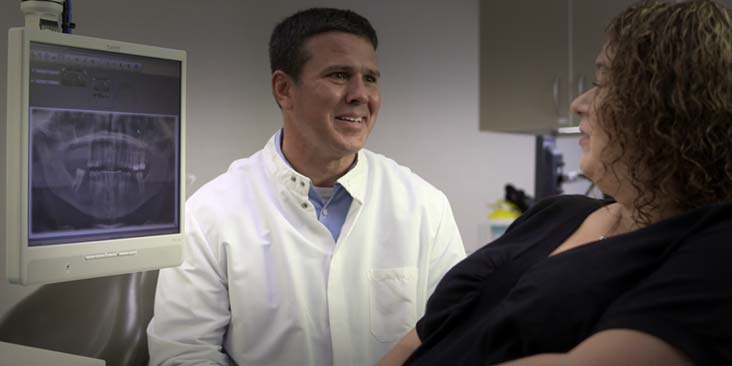
Periodontitis
What is Periodontitis?
Periodontitis is a serious gum infection that damages the soft tissue and destroys the bone that holds your teeth in place. Because of bone deterioration, periodontitis can cause teeth to loosen or fall out.
While periodontitis is relatively common, it is also largely preventable. Normally the result of poor oral hygiene, brushing twice a day, flossing daily and seeing your dentist for routine cleanings and check-ups greatly reduce the risk of developing periodontitis.
Signs, Symptoms, and Causes of Periodontitis
Signs and Symptoms
- Healthy gums are firm and pale pink. They fit snugly around each tooth. Signs and symptoms of periodontitis can include:
- Bad breath
- Bright red, dusky or purplish gums
- Gums that feel tender when touched
- Swollen or puffy gums
- Gums that bleed easily
- Gums that pull away from your teeth or recede
- New spaces developing between your teeth
- Pus between your teeth and gums
- Loose teeth
- Painful chewing
- A change in the way your teeth fit together when you bite
Types of Periodontitis
There are several different types of periodontitis. The more common types include:
Chronic periodontitis is the most common type, affecting mostly adults, though children can be affected. This type is caused by plaque buildup and involves slow deterioration that may improve and get worse over time but causes destruction in the gums and bone and loss of teeth if it goes untreated.
Aggressive periodontitis usually begins in childhood or early adulthood and affects only a small number of people. It tends to affect families and causes rapid progression of bone and tooth loss if untreated.
Causes of Periodontal Disease
In most cases, periodontal disease begins with plaque. If plaque forms on your teeth and is not removed by brushing, flossing and proper oral hygiene, it can harden under your gumline into tartar.
Once tartar is formed, regular at-home oral hygiene practice will not be able to remove the tartar. Tartar is filled with bacteria and the longer it is left on the teeth, the more damage it can cause. Your dentist would have to remove the tartar.
Plaque can cause gingivitis which is a mild form of periodontal disease. Gingivitis is the irritation and inflammation of the gum around the base of your teeth, which can be reversed with professional treatment and good at-home oral hygiene.
Ongoing gum inflammation can cause periodontitis as it would eventually cause pockets to form between your gums and teeth. As the pockets fill with plaque, tartar, and bacteria, deep infections become more serious and painful and if untreated, lead to a loss of tissue, bone, and ultimately teeth.
Risk Factors
Factors that can increase your risk of periodontitis include:
- Gingivitis
- Poor oral health habits
- Smoking or chewing tobacco
- Older age
- Hormonal changes, such as those related to pregnancy or menopause
- Substance abuse
- Obesity
- Inadequate nutrition, including vitamin C deficiency
- Genetics
- Certain medications that cause dry mouth or gum changes
- Conditions that cause decreased immunity, such as leukemia, HIV/AIDS and cancer treatment
- Certain diseases, such as diabetes, rheumatoid arthritis, and Crohn's disease
When to See a Dentist
You should see your dentist if your gums become chronically swollen or begin to bleed easily. You should not be in pain. If your gums are tender to touch or you are experiencing pain while chewing and eating, your body is signaling that something is wrong. You should follow your dentist’s recommended schedule for appointments and if you notice any symptoms of periodontitis, make an appointment as soon as possible. Catching periodontist early is the best way to prevent escalation and reverse any damages.
Also consider reading…
Gum Disease Treatment
Flossing Teeth
Gum Disease
Gum Disease Symptoms
Our Services
Dental Associates offers complete family dentistry plus specialty services like orthodontics, oral surgery, and dental implants. Click to learn more.
Dental Associates Locations
We have over a dozen convenient locations in Wisconsin. From Kenosha and Racine, up through Milwaukee, Fond du Lac, and Appleton to Green Bay.

